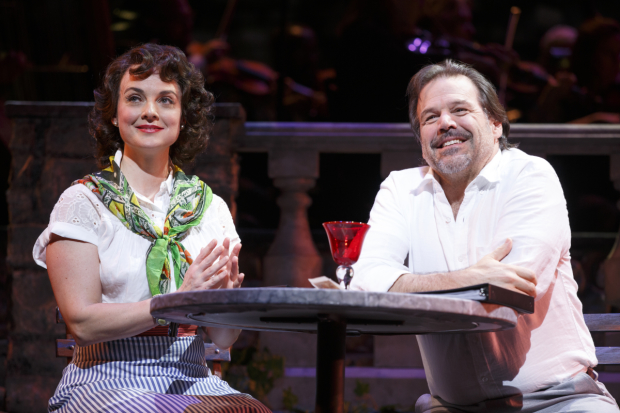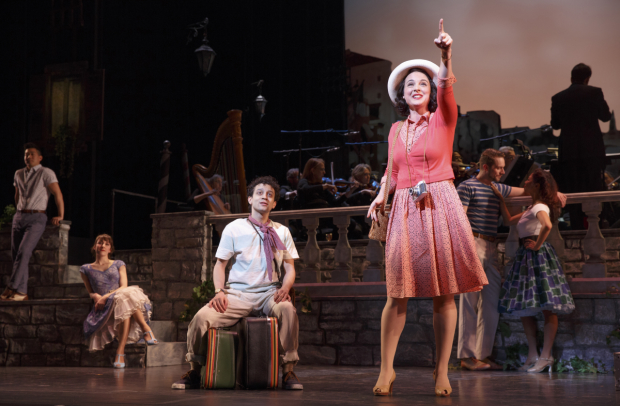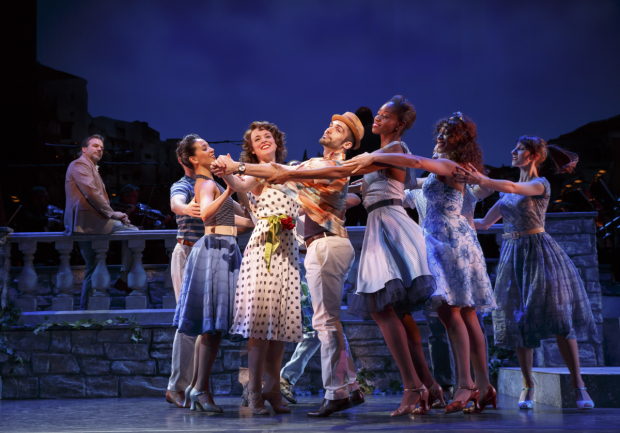Do I Hear a Waltz?
The 1965 collaboration between Richard Rodgers and Stephen Sondheim gets a hearing at Encores!

(© Joan Marcus)
Richard Rodgers wrote for a big orchestra. That is clear for anyone who has had the pleasure of hearing his music in a symphony or pops concert (or, more rarely, in a production with a large pit). His work is a natural fit for Encores!, the New York City Center series that puts the orchestra onstage. That is why this mounting of Do I Hear A Waltz? is so often enjoyable, even when one can recognize that it is not a particularly great musical.
A famously troubled collaboration among the famously troublesome book writer Arthur Laurents, a late-career Rodgers, and young lyricist Stephen Sondheim, Do I Hear A Waltz? might be a case of too many willful personalities in one musical. Many of Rodgers' melodies are gorgeous and sweeping (especially as performed by Rob Berman and the Encores! orchestra). Sondheim's lyrics are witty and revealing. Laurents presents an intelligent adult tale of love and marriage (and the difference between the two). Still, the pieces never quite fit together in a way that engages our hearts, rather than just our brains.
Based on Laurents' 1952 play, The Time of the Cuckoo, Waltz is the story of Leona Samish (Melissa Errico), an American tourist in Venice. She's staying at the pensione owned by Signora Fioria (a charmingly world-weary Karen Ziemba). Two American couples are also staying there: The aggressively perfect Yeagers (Claybourne Elder and Sarah Hunt) and the happily retired McIlhennys (Richard Poe and Nancy Opel). Leona is a fifth wheel until she meets souvenir dealer Renato Di Rossi (Richard Troxell), who might just sweep her off her feet — that is, if she can get over the fact that he's already married.
Rodgers sets this Venetian affair in his typically Viennese style, giving us a first-rate waltz in the title song. "Here We Are Again" (sung by Leona while she's on a date with herself) features biting Sondheim lyrics couched in a beautiful Rodgers melody. Errico delivers both with the perfect amount of tragic loveliness. Other numbers seem like filler, like the air travel kvetch "What Do We Do? We Fly," a Jerry Seinfeld routine in 2/4 time.
Sondheim's original lyrics to the Yeagers' duet, "We're Gonna Be All Right" (allegedly vetoed by Dorothy Rodgers, for whom the song may have struck a little too close to home) are thrillingly restored here. While the edited version was considerably tamer, it's still fun to imagine how the lyric, "Sometimes she drinks in bed, / Sometimes he's homosexual," would have landed on a Broadway audience circa 1965.
Relying ever so slightly on our imaginations, director Evan Cabnet sketches an idyllic Venice onstage: Anna Louizos' set features vines growing up faux stone steps. The actors wear Paloma Young's tasteful pastel costumes, perfect for an exotic summer in Italy.

(© Joan Marcus)
While we're at it, if one is to have an Italian lover, he might as well be an operatic tenor, which Troxell (who recently made his Met debut) most assuredly is. His effortlessly resonant voice soars over the swooning strings and demure woodwinds, sounding especially magnificent in the first-act finale, "Take the Moment." It's almost enough to make us forget that his Italian accent is one "mamma mia" shy of a Ragú commercial.
Matching him with her exaggerated WASP accent (not a vowel goes unswallowed), Errico brings a manic intensity to Leona that proves highly illuminating to the story. She's like Little Edie goes to Venice, pining after a storybook romance and, in the process, sabotaging all possibility of something more modest (but still fun). Nothing could possibly compare to the love story playing in her head.
This is abundantly clear in the title song. Chase Brock has choreographed a beautiful dream ballet in which Leona waltzes with the ensemble, completely in love with love. This necessarily gives way to reality, in which our two lovers put four left feet forward in a supremely awkward first dance. We know, then and there, that this just isn't going to work out.
Under Cabnet's imaginative direction, it's the supporting players who make the strongest impression: Sarah Stiles steals all of her scenes as the blasé hotel worker Giovanna while Michael Rosen makes the most credible Italian as the shy and polite Vito di Rossi. Meanwhile, Brock choreographs little trysts for the ensemble to perform throughout the show, graceful love triangles that seem to rearrange with the summer breeze. We want to know more about these attractive and mysterious Italians.

(© Joan Marcus)
Unfortunately, most of our time is devoted to the "wash and wear Americans" at the center of the plot. The Yeagers are fairly obnoxious and their marriage feels expendable, so we never worry about the B-plot romance that threatens it. The McIlhennys are adorable and their union is never in question. And since everyone is on vacation, we know that any affairs will be necessarily fleeting. The stakes couldn't be much lower.
"I often wonder what would have happened to Romeo and Juliet had they not died," Fioria muses in one of the funniest lines in the show. Leona and Renato don't even have that spark of adolescent passion. Instead, there is only the promise of a slightly mismatched fling that never satisfyingly comes to fruition. Do I Hear a Waltz? is perhaps the most charming and melodic setting of an abortive romance ever to play a Broadway stage.











